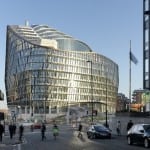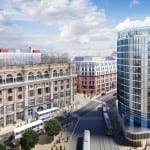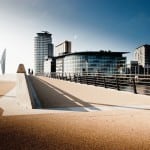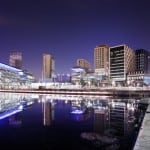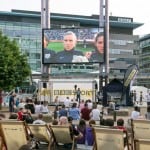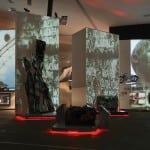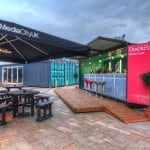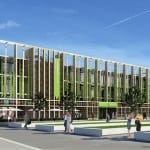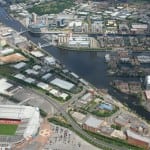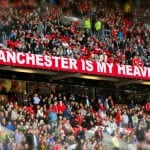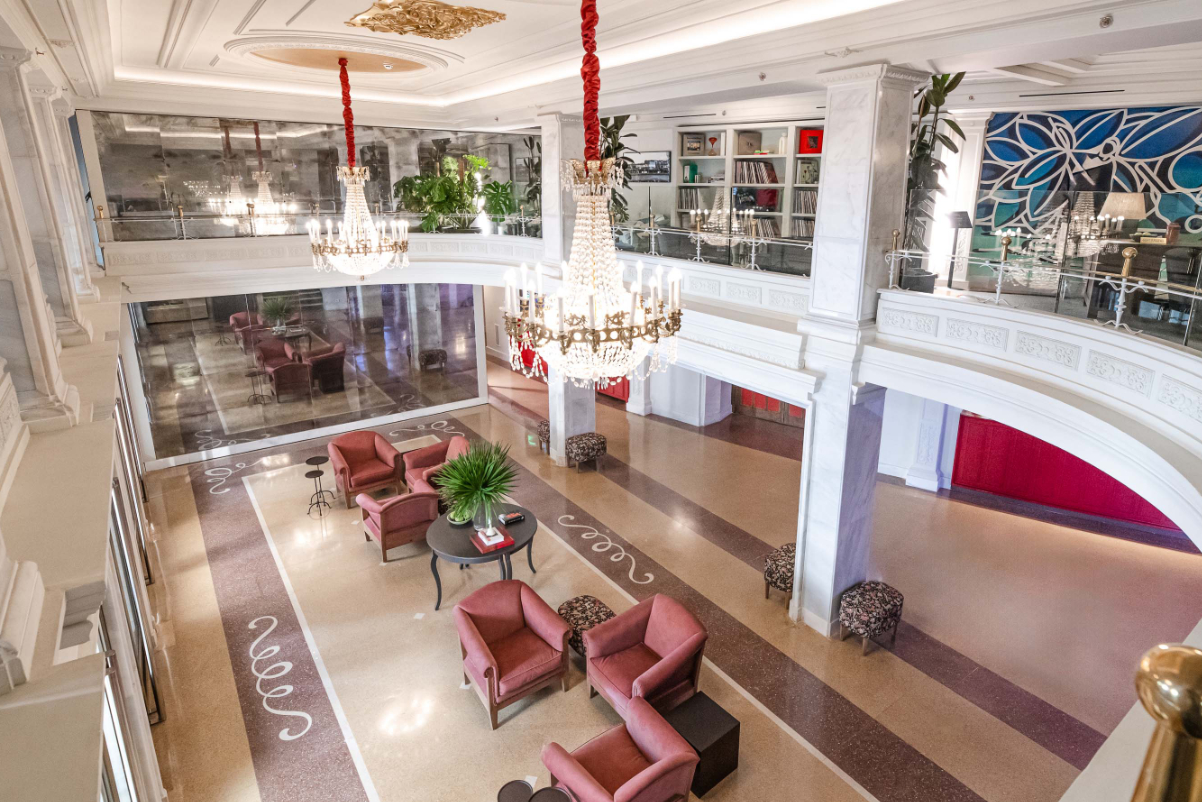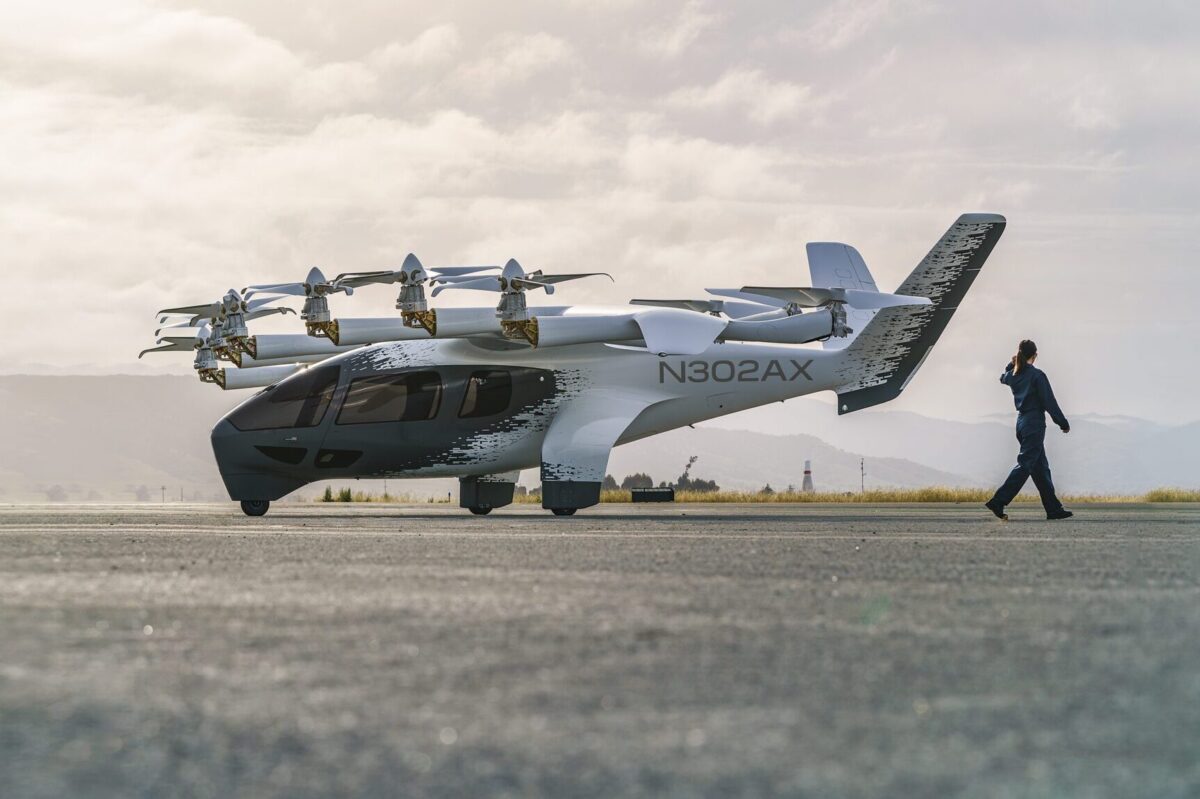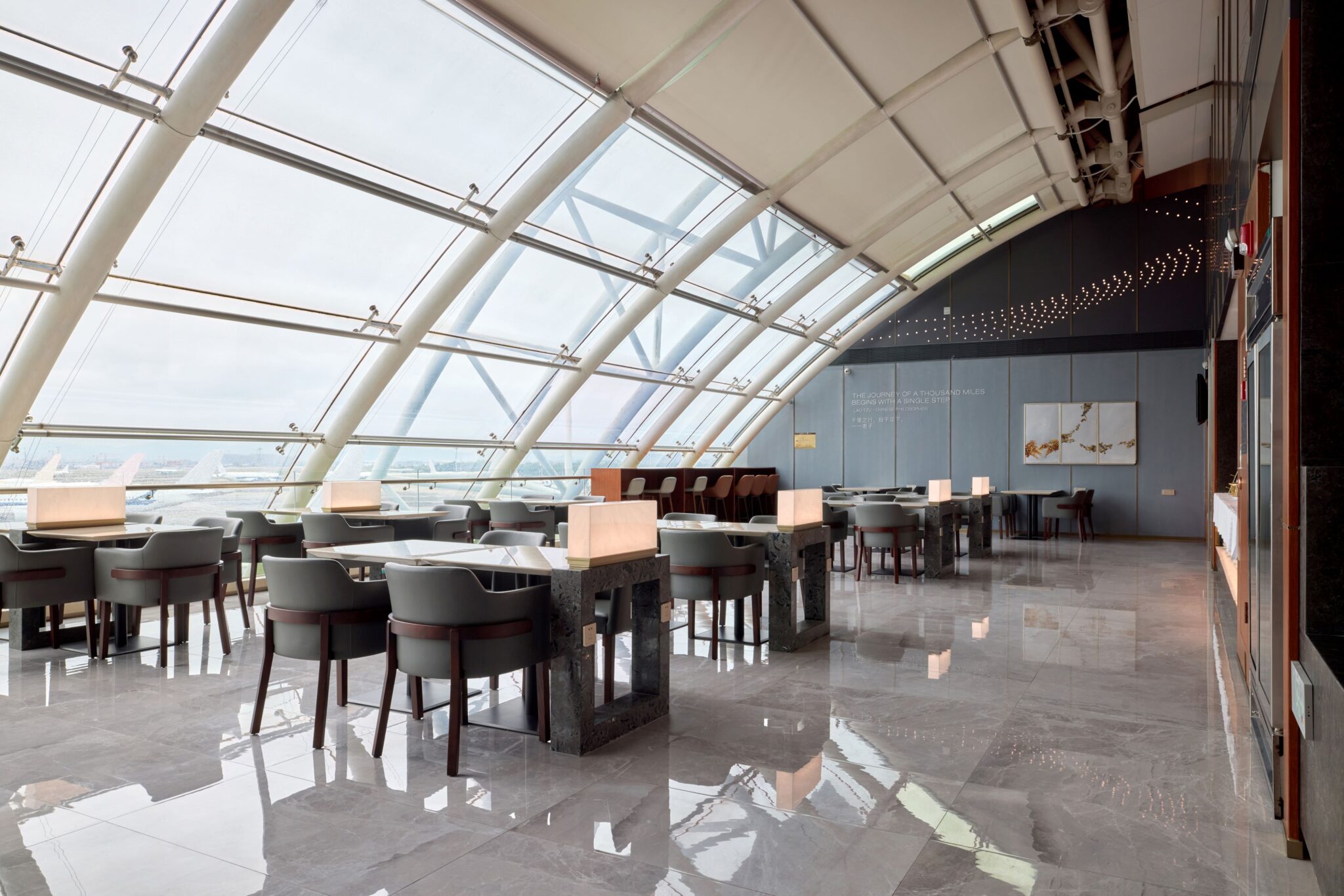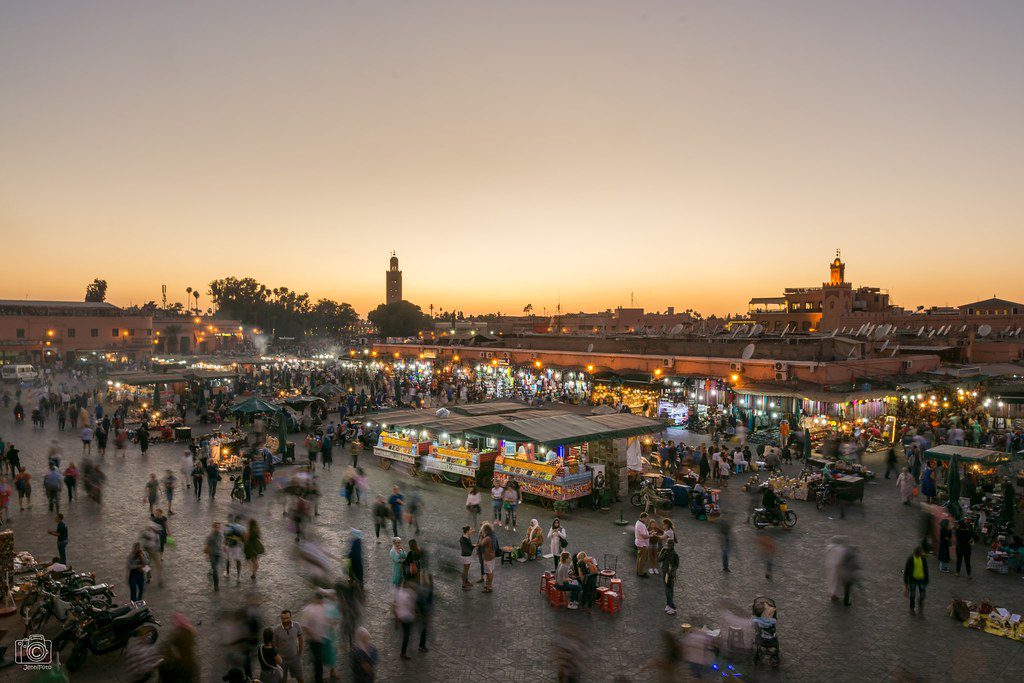Manchester Spent 15 Years Building a ‘Smart City,’ Now It Wants Tourists
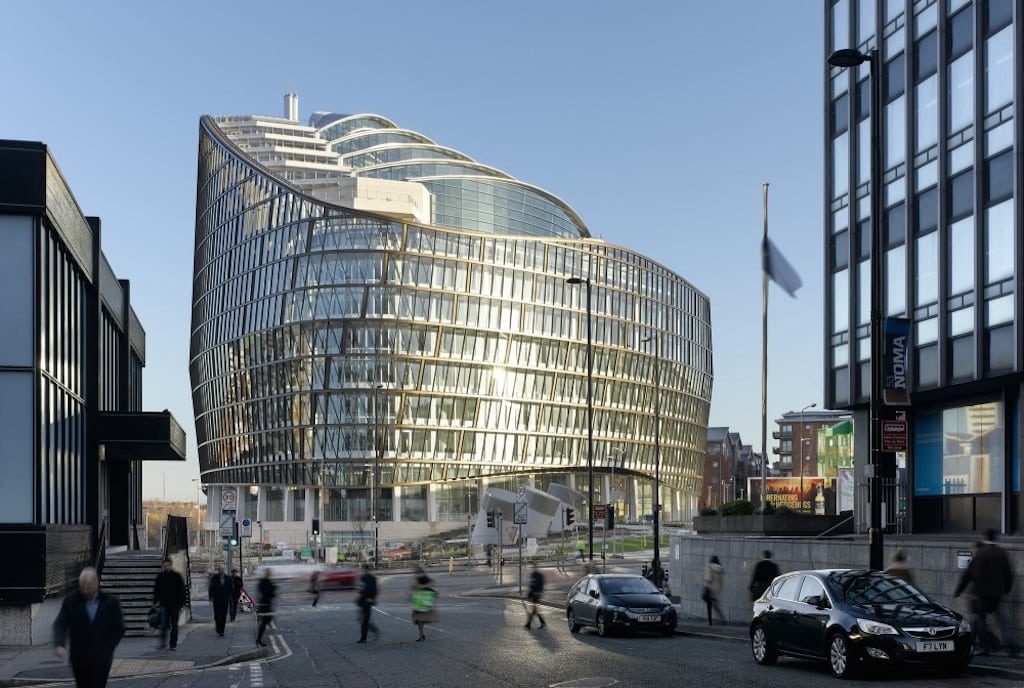
Skift Take
- One Angel Square, NOMA
- Rendering of NOMA
- MediaCityUK and BBC North
- MediaCityUK at Salford Quays
- BBC North event, MediaCityUK
- Imperial War Museum North, MediaCityUK
- DockBar, MediaCityUK
- High-tech culture, MediaCityUK
- The Greenhouse, MediaCityUK
- The new HOME visual arts and performance venue
- Manchester United’s home stadium (lower left); MediaCityUK (upper middle)
- Salford Quays
- Manchester United soccer is a religion
Located two hours north of London by train, Manchester is England’s second most populous city, but it’s always had a bit of an identity problem among U.S. travelers.
Other than being home to the world’s most famous soccer team, Manchester has never registered significantly in the States because it’s typically overshadowed by the bucket list travel experiences in London and the surrounding English countryside.
That’s beginning to change. Manchester’s civic, business and cultural leaders have spent the last 15 years following an all-encompassing redevelopment plan to forge a “smart city” of the future anchored around one of Europe’s most integrated and innovative urban renewal strategies.
Manchester has been at the forefront of technology, industry and culture since the 1600s, illustrated in this list of Manchester Firsts, including the world’s first steamboat, submarine, international art exhibition, permanent orchestra and public library.
In the 1800s, the invention of the cotton jenny in Manchester spawned the Industrial Revolution. By the early 20th century, over 90% of the world’s cotton was traded here after arriving via cargo ships traversing the world’s first shipping canal into the world’s first industrial park.
With the advent of globalization and container shipping however, Manchester’s primary economic engine revolving around the Salford Quays port went bust in the 1970s, remaining a post-industrial wasteland for over two decades.
Following a massive revitalization and land reclamation project, Salford Quays is now home to MediaCityUK. The self-contained, high-tech hub and media/design community is anchored by the shiny new BBC North headquarters and the University of Salford. They are surrounded by a colorful array of co-working spaces, world-class cultural venues, and expanding residential and mixed-use development.
MediaCity began to attract attention with the opening of the Imperial War Museum North in 2002, designed by architect Daniel Libeskind. The museum, which examines the impact of war on people’s lives, is composed of three dramatic structural “shards.” Libeskind says his aggressively modernist design was inspired by a broken tea cup on the floor.
Over the last few years, the focus in MediaCity has revolved around building out the number of tech/media tenants with a growing array of co-work spaces.
For example, The Landing “houses the region’s only Usability Rooms for testing and analysing games and interactive technologies as well as the UK’s only Digital Workflow Centre.” The Pie Factory’s spaces cater to media production industries, while The Greenhouse welcomes indie tech scenesters on a budget. And all of it is surrounded by throngs of locals and visitors gathering in the public promenades along the canals.
“The demand for space for the first part of the year has been unprecedented and remains brisk,” said Lynn Haime, asset manager for MediaCityUK, recently in MediaCity Daily. “It reflects that the market has turned a corner and that the digital and creative industries are booming.”
After two decades in the making, beginning with the land clean-up, MediaCity has proven itself as a working prototype for the smart city of the 21st century, integrating commercial, residential and academic infrastructure in a sustainable and highly connected whole. Phase 1, encompassing 36 acres of land, was completed with the BBC North building opening in 2011. Another 150 acres have been zoned for expansion over the next decade.
“MediaCityUK has completely transformed the landscape at Salford Quays, which has both reinvigorated the city’s economy and thrown the spotlight on Manchester as a major international hub for creative industries,” says Anthony Cassidy, international sales manager for Visit Manchester.
Manchester’s tourism numbers are responding. For 2013, the city achieved record levels in hotel occupancy, and according to STR Global, hotel ADR (average daily rate) for March this year was up 13.2% over 2013.
“Manchester defined the urban industrial age, it was the original modern city,” says Cassidy. “In its reinvention as a contemporary metropolis, Manchester continues to break the mold, combining historical importance, award-winning architecture and rich culture. We are the very definition of the post-industrial city made good.”
The Future Modern City
In November last year, Her Majesty Queen Elizabeth and the Duke of Edinburgh officially opened the egg-shaped One Angel Square building in Manchester’s historic central core. BREEAM (Europe’s equivalent to LEED) gave the building its highest ever environmental assessment, and the BBC anointed it “The Greenest Building in the World.”
One Angel Square is the new headquarters for The Co-operative Group. The largest membership-based company in the UK, with nearly eight million constituents, The Co-operative has been involved in myriad industries including banking, tech, healthcare, agriculture and many others since its inception 150 years ago.
The new building is also the anchor and the first major completed project of the ambitious 20-acre NOMA urban redevelopment project. The premise with NOMA is that it’s not entirely difficult to build a smart city from scratch on vacant land, like Songdo in Korea, Masdar in the U.A.E., or even MediaCity in Salford Quays.
But trying to weave that into the center of a thriving European metropolis while incorporating all of the existing historic buildings and maintaining the social fabric is another story. NOMA, which will include at least two hotels and other tourism-related infrastructure, was designed to reimagine the 21st century city.
“This building highlights our approach to innovation and how we’re leading the way in long-term business development and urban living,” says Ruairidh Jackson, director of strategy/development at NOMA.
Jackson explains that the entire NOMA project is designed to share information and innovation in tech, design, IT and urban planning with any visiting corporate, scientific and academic group who wants to listen.
“We want to use this as a live test bed,” he says. “It’s a building technology system to show that anyone can do this, and that it has positive economic benefits.”
Last month, The Co-operative entered a 50/50 partnership with Hermes Real Estate to develop NOMA over the next 10 years. The deal is expected to be finalized by the end of this month.
Already, NOMA is playing a significant role for pop-up venues and events like the city’s annual FutureEverything Festival. Now in its 19th year, the festival is proclaimed by The Guardian as one of the top 10 idea incubators in the world. Check out the website. Some amazing projects here like the Intel-supported Smart Citizen project, which argues that the smart city is potentially a broken model without smart citizens living in it.
The Future Meeting City
Over the last half decade, Visit Manchester has been actively promoting the city’s legacy of industrial and academic innovation to international corporate and association groups.
The idea that a destination can be sold successfully to meeting and conference travel planners based on mechanisms in place for knowledge sharing among high tech industries is an incredibly exciting trend. It’s being spurred by the need for DMOs to better differentiate their markets within their ever-tightening competitive sets for high-worth business events.
“The Holy Grail is facilitating the transfer of knowledge between congress delegates and the local community,” says Cassidy. “By harnessing the power of intensive debate, Manchester can become known for intellect, knowledge and innovation, boosting our key sectors and solidifying our position as a global destination.”
Looking ahead, EuroScience named Manchester the European City of Science for 2016, which includes hosting the EuroScience Open Forum 2016—the largest general science symposium in Europe.
Cassidy says, “In the next couple of years we’ll be doing lots of activity around that to promote Manchester as a commercial science city.”
Greg Oates covers hotel/tourism development and travel brand media. He has toured over 1,000 hotels in 50+ countries. email / twitter
